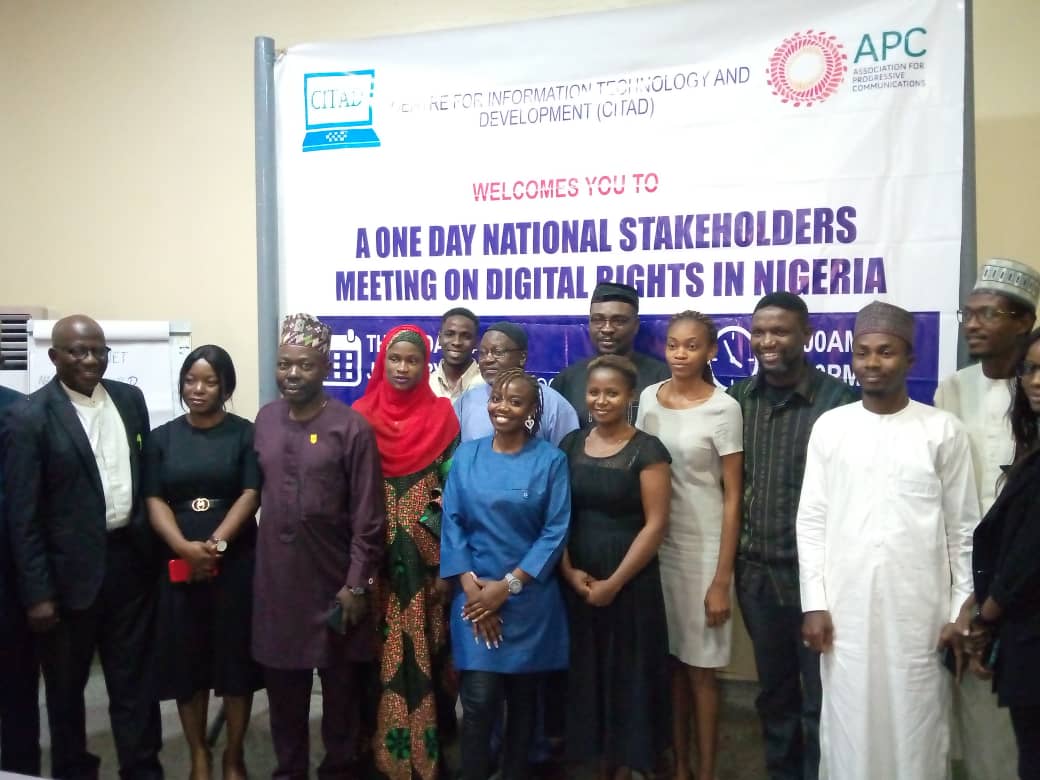By Chimezie Godfrey
Stakeholder have advised that the Nigeria Police Force should be equipped with the required skills to handle cases of crimes committed against citizens online.
This was part of the recommendations made at the end of the “National Stakeholders Meeting on Digital Rights in Nigeria”, organized by the Centre for Information Technology and Development (CITAD) held recently in Abuja.
In a Communique signed by Dr. Abdulhamid Abdullahi, ABU Zaria; Suleiman Mande, CISLAC; Osai Oijgho, Amnesty International;
Angela Uzoma-Iwuchukwu, Country Director, Avocats Sans Frontieres France; and Ali Sabo, Centre for Information Technology and Development, the stakeholders after robust discussions and deliberations, made the following observations which includes; that digital rights are extension of human rights, technology is affecting humanity in different ways and it is providing unique platforms that will ultimately revolutionize engagements from offline to online, a large number of people in Nigeria are operating on the digital space and that whenever election approaches, the political atmosphere becomes charged.
According to the Communique, stakeholders also observed that there are cases of citizens’ surveillance which is shrinking the digital space, and that there is no known specific pronouncements by our courts on digital rights in Nigeria.
Others includes that the traditional roles of the media in advocacy, reporting, investigation, documentation, agenda setting and analysis are still applicable to the issue of human rights as in the case of digital rights; there is still a wider knowledge gap on digital rights in Nigeria; and that Nigeria’s economy is also evolving digitally as other parts of the world.
The Communique therefore disclosed that participants recommended that the Nigeria Police Force should be empowered with the capacity to handle cases of crimes committed against citizens online, and that violators of rights online should be made to account for their actions, among others.
It stated,”Nigeria Police Force should be equipped with required skills to handle cases of crimes committed against citizens online.
“Violators of rights online should be made to account for their actions.
“There should be control on the import and export of surveillance technologies to stem the trend of digital authoritarianism.
“There should be collaborations with critical stakeholders on digital literacy campaigns.
“Activists should brace up and rise up to ensure the right of citizens online is a priority.”
The Communique also stated that discussions on digital rights in Nigeria are narrow and stakeholders should extend the conversation to issues around control, data usage and content creation.
It also stressed that there is need for the media to undertake advocacy and campaign for internet access and affordability which is critical in shaping discourse on digital rights;
“There should be knowledge development on local production of digital tools and improved access.
“MDAs such as the Federal Competition and Consumer Protection Commission (FCCPC), National Human Rights Commission (NHRC) etc should be mainstreamed into digital rights conversations.
“There is need for stakeholders to intensify engagements with lawmakers.
“There is the need for government to take concrete measure to promote digital inclusion so as those who are currently left behind could also have access to digital rights,” it stated.
It called on the government to provide a policy on community networks that would empower citizens and communities to address their connectivity needs by themselves.
The Communique disclosed that the stakeholders suggested action points to actualize the stated recommendations, which include that digital rights activists and other stakeholders should vigorously champion the review/repeal of laws that promote digital authoritarianism, among others.
“Stakeholders therefore suggested the following action points: Digital rights activists and other stakeholders should vigorously champion the review/repeal of laws that promote digital authoritarianism;
“Engage legislators with a view to concluding and passing the bill on digital rights currently on the floor of the National Assembly.
“There is a need to engage with candidates in the conversation on Digital Rights and Freedom Bill as we approach elections;
“Media to engage technology not only as consumers or users but as critical gatekeepers.
“Digital Rights advocacy effort should include rural areas and marginalized groups,” it stated.


